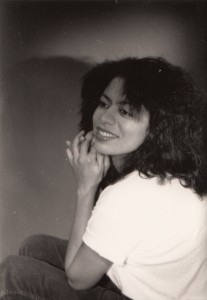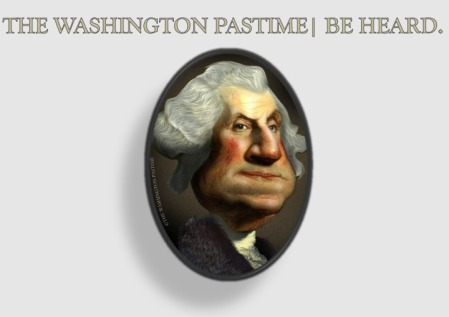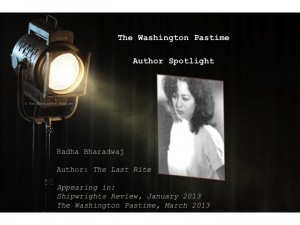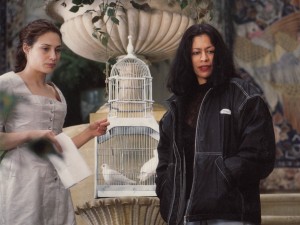Radha Bharadwaj is an Indian film maker and writer who moved to the U.S. in her late teens. She received her MFA in Radio, TV, and Film from Temple University’s School of Media and Communication, and is most well known for her directorial debut, Closet Land (1991) which she also wrote. She is also well known for Basil (1998), which she wrote and directed. In addition to The Washington Pastime, Bharadwaj has been recently published in Notes from the Underground (Strictly Verboten), Unlikely Stories, (The Rains of Ramghat), Writing Disorder, (In Perfect Balance) and Shipwrights Review (The Last Rite [Original Publication]). Her current project is novelizing her feature script for Death by Drowning, which, when complete, will be her third book.
You can visit Radha on her website, www.closetlands.com, and you can “like” and follow her on her Facebook fan page. Radha’s stage adaptation of her screenplay for Closet Land is available on CreateSpace.
–
If someone googles you, the first thing they’re most likely to see would be Closet Land. Can you tell me a little bit about what that experience was like, looking back on it over 20 years later?
It is as rich and passionate an experience as when I first wrote the screenplay and directed the film. I felt an enormous commitment to the material—that it was bigger than me, that it had its own voice—and my task, after I finished the script, was to really be its guardian & shepherd it as best as I could.
Now the theatre play version of Closet Land (which I adapted from my own screenplay) is being staged all over the world by various theatre groups—and every production is a special joy to me, that the work and the ideas continue to live. This is what keeps the material current—the continued interest in the film and its off-shoots. The film was also written about by writers like Kate Millett (The Politics of Cruelty) and Kathleen Murphy (Film Comment), and is, I understand, taught in some universities as well. So all that activity keeps it current.
That said, I feel the same passion and commitment to all my work, and the goal is to have other work that the search engines can identify me with.
I write to express something within that won’t be quelled. Ultimately, it’s like a song I sing for my own personal evolution — my own journey as a person. At its best, it’s spiritual. And if what I write resonates with other souls on their journey, all the better.
Your main credits on your website and on wikapedia are as a director and screenplay writer. Yet, it’s clear from your recent publications that you’ve been at least dabbling in short stories. Is that accurate?
and screenplay writer. Yet, it’s clear from your recent publications that you’ve been at least dabbling in short stories. Is that accurate?
I have been writing short stories and poems for a long time. It’s been a way to stay limber. Only recently did I decide to get the stories out. I was very fortunate in finding excellent publications like yours that responded enthusiastically to my work. And the encouragement of editors like you has spurred me to write more short fiction. I hope this trend continues! All creative activity is equally valuable, and my decision to get my short stories published came from that belief.
I’ve unfortunately been a bit lax with my website. The best way to follow me would be on the Facebook page for Closet Land.
This is probably the most important question I’ll ask, and yet it’s the one people so often overlook: Why do you write?
To express something within that won’t be quelled. Ultimately, it’s like a song I sing for my own personal evolution—my own journey as a person. At its best, it’s spiritual. And if what I write resonates with other souls on their journey, all the better.
Is there anything particularly appealing to you about short stories as an art form, or do you prefer writing novels and screenplays?
I enjoy all equally. Writing “pure” prose (short stories, novels), demands more from the writer. It grows you more, as a writer. Screenplays are often treated as blueprints (for the director and producers and stars to do what they will with it), and hence are seen as more functional. That is not to say there aren’t screenwriters whose scripts read like fully developed books. Ernest Lehman (The Sound of Music) always comes to mind, as a case in point. But screenwriters who have a strong point of view, an original take on things, a unique perspective, might find writing books and short stories develops their ideas and characters more, and that prose is a better forum to showcase their unique visions.
The Last Rite was a striking piece to us for everything that it was, and everything that it wasn’t. Can you talk a little about trying to balance telling a really compelling story to a western audience about a traditional woman from India? How do you reconcile her basic, human concerns and the “religious reality” of living in a rural, (seemingly) third-world environment?
The one thing I want to do is let Western audiences know that people living in India aren’t really that different from them. We are all cut from the same human cloth. Ganga’s choices come from where she lives—in a desert; and when one is as poor as she is, there are few choices. Anyone in her shoes, with her strong personality and unflinching pragmatism, will likely do the same. The story would work equally in any extreme situation anywhere.It’s therefore a special thrill to me when Western readers spark to the same emotions in the story. Because their reaction validates what I’m trying to do: I want to strip the veneer of “the other” that typically shrouds characters from non-Western cultures, in books and other works that are intended for a Western audience. We are all the same. We carry within us the same palette, the same disposition towards good or evil. The differences—culture, skin colour, faith—are minor compared to what we share in common.
In The Last Rite, is there anything particularly interesting to you about water as a literary symbol, or is it just a means to an end?
Water is a basic necessity, but I wanted to elevate it into something rarer than gold. Which it would be, in a desert. When something that is so essential to survival is as scarce as it is in the story, the stakes go up, and the possibility for conflict, for tension, for suspense, all increase. All rich turf, for the story-teller.
Did growing up in India influence your art when you came to the U.S.? Did you notice a distinct difference between Indian fiction and Western “art”?
I create because I grew up in a rich cultural environment that was filled with the most incredible stories and myths from Hinduism. Nothing I’ve read, to date (and there are a lot of books I love)—comes close to The Mahabharata, in my estimation. Added to the literature was Indian classical music and dance (not Bollywood!) that we were exposed to as children. I think all of those influences contributed to anything I now do.
I was also exposed to Western art and literature since early childhood. But my roots are solidly in Hindu culture. My themes and philosophy spring from Hinduism’s Vedanta. It influences my best work. And since my roots, in the faith and culture of my own forbears, are very strong, I can look and admire and even participate in Western art and media—without losing my sense of self, my purpose, my distinct voice.
What’s next for you in your career as an artist? Can we expect more short stories, a short story anthology, more films, novels…?
All of what you mention! Why not? I believe in abundance. One thing leads to the next. Most films these days are based on books. Short stories lead to TV shows or plays. Once you create a product—be it a story, a book, a screenplay—the possibilities for the shapes it will take are endless. And writers have to be open to these opportunities for their work, and utilize that critical moment when one door opens, to unlock other doors.
Writers have to be open to these opportunities for their work, and utilize that critical moment when one door opens, to unlock other doors.
What’s more rewarding for you: the journey (i.e. writing a piece) or the destination (ie. Seeing it published, seeing the finished product)?
Writing the best one can is always an enormous reward—no one can ever take that away from you. But I’ve also chosen to show and share my thoughts and writing with the world. So the publication of works, production of films & plays, is a key step for me. It’s necessary to finding and connecting with like-minded kindred souls.
Do you have a favorite book, author, film, or artist?
My favorite book is The Mahabharata. I love Hitchcock’s films — I learned a lot about suspense and creating tension in plot from his films.
What do you when you’re looking for inspiration?
My stories come to me from issues or ideas that for whatever reason, intrigue me. The Last Rite, for example, came out of a desire to create a Hindu Indian woman, who—though poor and unlettered—shows formidable strength and survival skills. Not the pretty dancing Bollywood heroine waiting for the hero to save her, but a real heroine — with a tough life and few resources, and only enormous courage for company.
Do you have any advice for writers and artists looking to make their mark in the world?
Believe in yourself. And it always helps if that belief is rooted something larger than yourself: an ideology, a principle, a way of looking at the world, a belief. That’s the anchor in unsafe waters, the compass when the way ahead seems unclear.
READ The Last Rite NOW!
The one thing I want to do is let Western audiences know that people living in India aren’t really that different from them.






